Holding yellow banners and clutching sunflowers, thousands took to the streets in Taipei yesterday as part of a nationwide “430 Sunflower No Nuke Action” protest, urging the government to stop construction of the Fourth Nuclear Plant in Gongliao District (貢寮), New Taipei City (新北市), and pursue a more sustainable energy policy.
With “smile at the sun, keep away from nuclear disasters” as the theme of the parade, yellow flowers were picked to symbolize sustainability. Some also held handmade paper windmills, symbolizing green energy and a bright future without the fear of a potential nuclear crisis.
The nation’s anti-nuclear movement gained new momentum in the middle of March after a massive earthquake struck Japan and unleashed a tsunami that damaged the Fukushima Dai-ichi nuclear power plant, causing radiation to be released, which has endangered northeastern Japan’s food and water supplies.
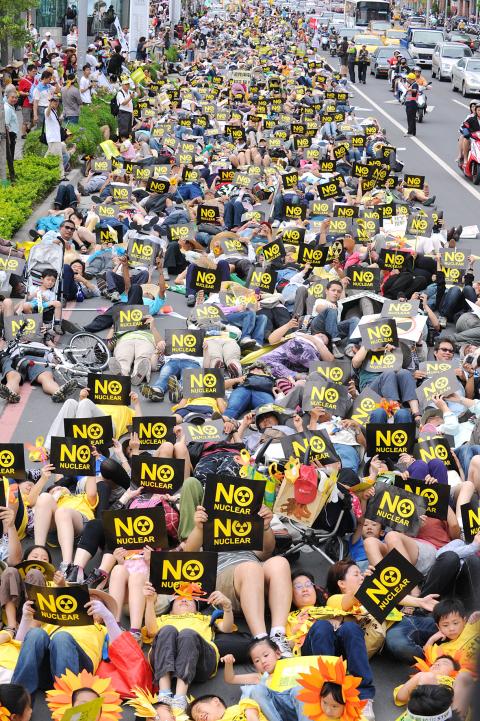
Photo: Huang Chih-yuan, Taipei Times
The disaster resonated especially strongly in Taiwan because, like Japan, it is prone to earthquakes that could lead to scenarios similar to those that crippled the Japanese plant.
People of all ages took part in the carnival-like parade yesterday.
A section of the parade, called the “Keep Away from Nuclear Disaster Division,” was led by about 20 people holding up a long yellow banner with the words “No Nukes” written on it, followed by a group of protesters wearing radiation protection suits to remind people about the potential severity of nuclear disasters.
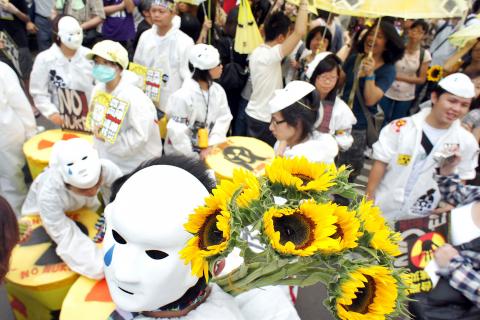
Photo: CNA
Another section was -comprised mostly of students from several universities.
Young people dressed in colorful clothes danced to music as they shouted anti--nuclear power slogans and paraded through the bustling streets.
“I think the government should replace nuclear power with other safer energy sources,” said a mother surnamed Chang (張), who stood on the sidewalk with other parents and children for a short break during the parade.
She said she wanted her daughter, who is in the first grade, to take part in the parade because they had been taught about nuclear power issues at school, and her daughter was happy to participate.
A student from an Aboriginal Tao village on Orchid Island (蘭嶼), where a nuclear waste storage facility is located, said the Tao people believed that nuclear radiation, which has no form or color, is like evil spirits and must be banished.
This inspired him to wear a traditional Tao warriors helmet made out of paper to symbolize fighting off evil spirits.
A 35-year-old woman surnamed Chen (陳) was dressed in a wedding gown and said that while the government is concerned about the nation’s low fertility rate, “we don’t want to get married and raise our children in such a dangerous environment.”
“After the Fukushima nuclear crisis, I think there are some things that are non-negotiable,” she added.
At one point, the crowd lay on the ground, pretending to be dead, after a simulated nuclear leakage siren sounded.
The display, called “If that day comes,” symbolized the many people that could die in Taiwan if a nuclear crisis were to unfold, the organizer said.
Appealing to the government to map out retirement plans for the nation’s three operational nuclear power plants, to put an end to the construction of the Fourth Nuclear Power Plant and to create a nuclear-free homeland where everyone can live without fear of a nuclear disaster, the protesters shouted slogans such as, “Cherish life, end nuclear power,” and “I want a nuclear-free homeland.”
Their two-and-a-half-hour parade eventually led them to the Presidential Office on Ketagalan Boulevard.
Two Japanese, Ono Saiko and Oga Ayako, who said they were forced to leave their homes in Fukushima Prefecture because of the nuclear crisis, joined the parade in Taipei and shared their thoughts with the crowd.
“The Fukushima nuclear crisis is still going on in Japan; we are not in the mood to find fault with the cause, but we are facing a problem of how are we to protect our next generation,” Saiko said.
She said that she hopes people in Taiwan can join forces with people in Fukushima and take nuclear problems more seriously.
Oga Ayako said she saw “hope and power” in the protest in Taipei, and hopes that the next time they are in Taiwan it will be a nation free from nuclear threats.
Organizers estimated that at least 5,000 people turned out for the protest in Taipei, but no police figure was immediately available.
Additional reporting by AFP and CNA
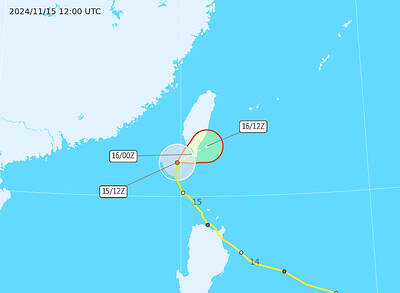
Typhoon Usagi yesterday had weakened into a tropical storm, but a land warning issued by the Central Weather Administration (CWA) was still in effect in four areas in southern Taiwan. As of 5pm yesterday, Tropical Storm Usagi was over waters 120km south-southwest of Oluanpi (鵝鑾鼻), the southernmost tip of Taiwan proper, and was moving north at 9kph, CWA data showed. The storm was expected to veer northeast later yesterday. It had maximum sustained winds of 101kph, with gusts of up to 126kph, the data showed. The CWA urged residents of Kaohsiung, Pingtung County, Taitung County and the Hengchun Peninsula (恆春) to remain alert to
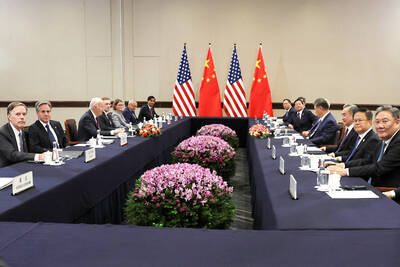
ONE LAST TALK: While Xi said that Taiwan was a ‘red line,’ Biden, in what is likely his last meeting with Xi as president, called for an end to China’s military activity around Taiwan China’s military intimidation and economic coercion against Taiwan are the main causes of tensions that are destabilizing peace in the Taiwan Strait, Taipei said yesterday while thanking US President Joe Biden for expressing Washington’s firm stance of maintaining peace and stability in the region. Biden and Chinese President Xi Jinping (習近平) met on Saturday for their third meeting and their first talks in seven months on the sidelines of the APEC forum in Lima, Peru. It was likely Biden’s last meeting as president with Xi. During their conversation, Biden reiterated the US’ opposition to any unilateral change to the “status quo” from either
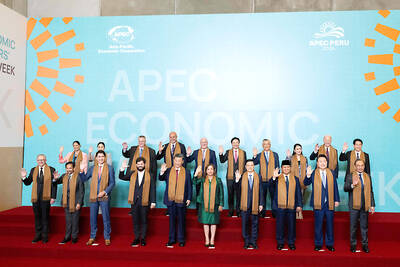
Taiwan would participate in the 2026 APEC summit to be hosted by China after Beijing promised it would ensure the personal safety of attendees, Taiwanese national security sources said yesterday. The APEC Leaders’ Machu Picchu Declaration announced yesterday said that China would host the APEC summit in 2026. Beijing proposed hosting the summit shortly before this year’s gathering began on Friday, a national security official said, speaking on condition of anonymity. Many APEC members expressed concerns about China hosting the event and said that prior communication over the decision was insufficient, the official said. Taiwan brought up concerns about legal “guidelines” China announced in
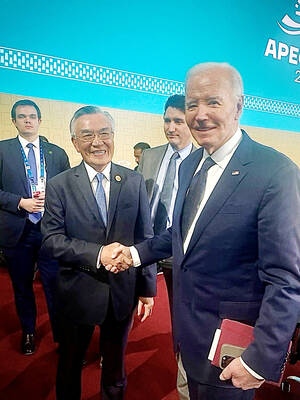
MEET AND GREET: The White House, which called the interaction ‘just a handshake,’ did not immediately respond to a request for comment on whether Biden planned to visit Taiwan’s envoy to the APEC summit, Lin Hsin-i (林信義), on Friday invited US President Joe Biden to visit Taiwan. During the APEC Leaders’ Informal Dialogue, Lin, who represented President William Lai (賴清德) at the summit, spoke with Biden and expressed gratitude to the outgoing US president for his contribution to improving bilateral ties between Taipei and Washington over the past four years, the Ministry of Foreign Affairs said. Lin and Biden exchanged views during the conversation, with Lin extending an invitation to Biden to visit Taiwan, it said. Biden is to step down in January next year, when US president-elect Donald Trump is